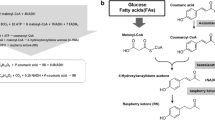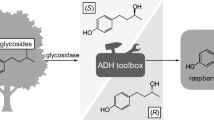Abstract
Raspberry ketone is an important ingredient in the flavor and fragrance industries. Due to its low content in fruits and vegetables, the production of natural raspberry ketone using heterologous synthesis in microbial strains is recently attracting increased attention. In this work, a heterologous pathway to produce raspberry ketone from p-coumaric acid, including 4-coumarate: CoA ligase (4CL), benzalacetone synthase (BAS), and raspberry ketone/zingerone synthase (RZS1) from plants, was successfully assembled in Escherichia coli. When the RZS1 gene was introduced into E. coli and co-expressed with two other genes, the intermediate 4-hydroxybenzylidene acetone in the pathway was almost completely transformed into a raspberry ketone. Substituting TB medium for M9 medium increased raspberry ketone titers by 3–4 times. Furthermore, the heterologous pathway was partitioned into two modules; module one produced p-coumaroyl-CoA from p-coumaric acid by 4CL, and module two produced raspberry ketone from coumaroyl-CoA by the action of BAS and RZS1. Optimizing the balanced expression of the two modules, it was shown that moderate expression of module one and high expression of module two was the best combination to enhance raspberry ketone production. The engineered strain CZ-8 reached 90.97 mg/l of raspberry ketone, which was 12 times higher than previously reported. In addition, the preferred approach of the heterologous pathway was related to the heterologous genes from different sources; for example, 4CL from Arabidopsis thaliana seemed to be more suitable for raspberry ketone production than that from Petroselinum crispum. This work paves an alternative way for future economic production of natural raspberry ketone.






Similar content being viewed by others
References
Abe I, Takahashi Y, Morita H, Noguchi H (2001) Benzalacetone synthase. A novel polyketide synthase that plays a crucial role in the biosynthesis of phenylbutanones in Rheum palmatum. Eur J Biochem 268:3354–3359. https://doi.org/10.1046/j.1432-1327.2001.02255.x
Abe T, Morita H, Noma H, Kohno T, Noguchi H, Abe I (2007) Structure function analysis of benzalacetone synthase from Rheum palmatum. Bioorg Med Chem Lett 17(11):3161–3166. https://doi.org/10.1016/j.bmcl.2007.03.029
Ajikumar PK, Xiao WH, Tyo KE, Wang Y, Simeon F, Leonard E, Mucha O, Phon TH, Pfeifer B, Stephanopoulos G (2010) Isoprenoid pathway optimization for Taxol precursor overproduction in Escherichia coli. Science 330(6000):70–74. https://doi.org/10.1126/science.1191652
Beekwilder J, Wolswinkel R, Jonker H, Hall R, de Vos CH, Bovy A (2006) Production of resveratrol in recombinant microorganisms. Appl Environ Microbiol 72(8):5670–5672. https://doi.org/10.1128/AEM.00609-06
Beekwilder J, van der Meer IM, Sibbesen O, Broekgaarden M, Qvist I, Mikkelsen JD, Hall RD (2007) Microbial production of natural raspberry ketone. J Biotechnol 2(10):1270–1279. https://doi.org/10.1002/biot.200700076
Borejsza-Wysocki W, Hrazdina G (1994) Biosynthesis of p-hydroxyphenylbutan-2-one in raspberry fruits and tissue cultures. Phytochem 35(3):623–628. https://doi.org/10.1016/S0031-9422(00)90575-2
Cheng Z, Jiang J, Wu H, Li Z, Ye Q (2016) Enhanced production of 3-hydroxypropionic acid from glucose via malonyl-CoA pathway by engineered Escherichia coli. Bioresour Technol 200:897–904. https://doi.org/10.1016/j.biortech.2015.10.107
Fischer M, Böker A, Berger RG (2001a) Fungal formation of raspberry ketone differs from the pathway in plant cell culture. Bioresour Technol 15(3):147–155. https://doi.org/10.1081/fbt-100107626
Fischer M, Böker A, Berger RG (2001b) Raspberry ketone from submerged cultured cells of the basidiomycete Nidula niveo-tomentosa. Biotechnol Prog 17:568–572
Fowler ZL, Koffas MA (2009) Biosynthesis and biotechnological production of flavanones: current state and perspectives. Appl Microbiol Biotechnol 83(5):799–808. https://doi.org/10.1007/s00253-009-2039-z
Gande R, Dover LG, Krumbach K, Besra GS, Sahm H, Oikawa T, Eggeling L (2007) The two carboxylases of Corynebacterium glutamicum essential for fatty acid and mycolic acid synthesis. J Bacteriol 189(14):5257–5264. https://doi.org/10.1128/JB.00254-07
Hakkinen ST, Seppanen-Laakso T, Oksman-Caldentey KM, Rischer H (2015) Bioconversion to raspberry ketone is achieved by several non-related plant cell cultures. Front Plant Sci 6:1035. https://doi.org/10.3389/fpls.2015.01035
Hrazdina G (2006) Aroma production by tissue cultures. J Agric Food Chem 54(4):1116–1123. https://doi.org/10.1021/jf053146w
Hugueny P, Dumont B, Ropert F, Belin JM (1995) The raspberry ketone, a biotechnological way for production. Colloq De Linra
Katsuyama Y, Funa N, Miyahisa I, Horinouchi S (2007) Synthesis of unnatural flavonoids and stilbenes by exploiting the plant biosynthetic pathway in Escherichia coli. Chem Biol 14(6):613–621. https://doi.org/10.1016/j.chembiol.2007.05.004
Kim M, Baek HS, Lee M, Park H, Shin SS, Choi DW, Lim KM (2016) Rhododenol and raspberry ketone impair the normal proliferation of melanocytes through reactive oxygen species-dependent activation of GADD45. Toxicol in Vitro 32:339–346. https://doi.org/10.1016/j.tiv.2016.02.003
Koeduka T, Watanabe B, Suzuki S, Hiratake J, Mano J, Yazaki K (2011) Characterization of raspberry ketone/zingerone synthase, catalyzing the alpha, beta-hydrogenation of phenylbutenones in raspberry fruits. Biochem Biophys Res Commun 412(1):104–108. https://doi.org/10.1016/j.bbrc.2011.07.052
Larsen M, Poll L (1992) Odour thresholds of some important aroma compounds in strawberries. Z Lebensm Unters Forsch 191:129–131. https://doi.org/10.1007/BF01201770
Larsen M, Poll L, Callesen O, Lewis M (1991) Relations between the content of aroma compounds and the sensory evaluation of 10 raspberry varieties (Rubus idaeusL). Acta Agric Scand 41(4):447–454. https://doi.org/10.1080/00015129109439927
Lee J (2016) Further research on the biological activities and the safety of raspberry ketone is needed. NFS J 2:15–18. https://doi.org/10.1016/j.nfs.2015.12.001
Lee D, Lloyd ND, Pretorius IS, Borneman AR (2016) Heterologous production of raspberry ketone in the wine yeast Saccharomyces cerevisiae via pathway engineering and synthetic enzyme fusion. Microb Cell Factories 15:49. https://doi.org/10.1186/s12934-016-0446-2
Leonard E, Lim KH, Saw PN, Koffas MA (2007) Engineering central metabolic pathways for high-level flavonoid production in Escherichia coli. Appl Environ Microbiol 73(12):3877–3886. https://doi.org/10.1128/AEM.00200-07
Leonard E, Yan Y, Fowler Z, Li Z, Lim C, Koffas MA (2008) Strain improvement of recombinant Escherichia coli for efficient production of plant flavonoids. Mol Pharm 5:257–265
Lim CG, Fowler ZL, Hueller T, Schaffer S, Koffas MA (2011) High-yield resveratrol production in engineered Escherichia coli. Appl Environ Microbiol 77(10):3451–3460. https://doi.org/10.1128/AEM.02186-10
Miyahisa I, Kaneko M, Funa N, Kawasaki H, Kojima H, Ohnishi Y, Horinouchi S (2005) Efficient production of (2S)-flavanones by Escherichia coli containing an artificial biosynthetic gene cluster. Appl Microbiol Biotechnol 68(4):498–504. https://doi.org/10.1007/s00253-005-1916-3
Morimoto C, Satoh Y, Hara M, Inoue S, Tsujita T, Okuda H (2005) Anti-obese action of raspberry ketone. Life Sci 77(2):194–204. https://doi.org/10.1016/j.lfs.2004.12.029
Pfleger BF, Pitera DJ, Smolke CD, Keasling JD (2006) Combinatorial engineering of intergenic regions in operons tunes expression of multiple genes. Nat Biotechnol 24:1027. https://doi.org/10.1038/nbt1226 https://www.nature.com/articles/nbt1226#supplementary-information
Santos CN, Koffas M, Stephanopoulos G (2011) Optimization of a heterologous pathway for the production of flavonoids from glucose. Metab Eng 13(4):392–400. https://doi.org/10.1016/j.ymben.2011.02.002
Stabnikova O, Wang JY, Ivanov V (2010) Value-added biotechnological products from organic wastes. Humana Press, New Jersey
Takamura Y, Nomura G (1988) Changes in the intracellular concentration of acetyl-CoA and malonyl-CoA in relation to the carbon and energy metabolism of Escherichia coli K12. J Gen Microbiol 134:2249–2253. https://doi.org/10.1099/00221287-134-8-2249
Wang L, Meng X, Zhang F (2012) Raspberry ketone protects rats fed high-fat diets against nonalcoholic steatohepatitis. J Med Food 15(5):495–503. https://doi.org/10.1089/jmf.2011.1717
Wu J, Liu P, Fan Y, Bao H, Du G, Zhou J, Chen J (2013) Multivariate modular metabolic engineering of Escherichia coli to produce resveratrol from L-tyrosine. J Biotechnol 167(4):404–411. https://doi.org/10.1016/j.jbiotec.2013.07.030
Xu P, Ranganathan S, Fowler ZL, Maranas CD, Koffas MA (2011) Genome-scale metabolic network modeling results in minimal interventions that cooperatively force carbon flux towards malonyl-CoA. Metab Eng 13(5):578–587. https://doi.org/10.1016/j.ymben.2011.06.00
Funding
The authors are grateful to the financial support from the National Natural Science Foundation of China (Grant No. 21604032), the National First-class Discipline Program of Light Industry Technology and Engineering (Grant No. LITE2018–04), and the Topnotch Academic Programs Project of Jiangsu Higher Education Institutions (TAPP).
Author information
Authors and Affiliations
Corresponding author
Ethics declarations
Conflict of interest
The authors declare that they have no conflict of interest.
Ethical approval
This article does not contain any studies with human participants or animals performed by any of the authors.
Additional information
Publisher’s note
Springer Nature remains neutral with regard to jurisdictional claims in published maps and institutional affiliations.
Electronic supplementary material
ESM 1
(PDF 554 kb)
Rights and permissions
About this article
Cite this article
Wang, C., Zheng, P. & Chen, P. Construction of synthetic pathways for raspberry ketone production in engineered Escherichia coli. Appl Microbiol Biotechnol 103, 3715–3725 (2019). https://doi.org/10.1007/s00253-019-09748-5
Received:
Revised:
Accepted:
Published:
Issue Date:
DOI: https://doi.org/10.1007/s00253-019-09748-5




